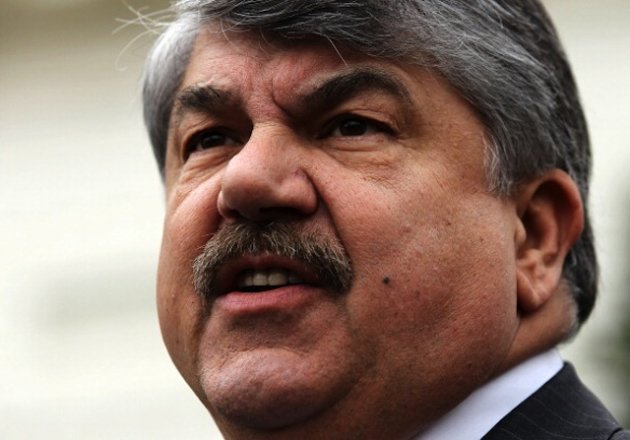 AFL-CIO President Richard Trumka speaks to the press after a meeting with President Barack Obama. (Alex Wong/Getty??
AFL-CIO President Richard Trumka speaks to the press after a meeting with President Barack Obama. (Alex Wong/Getty??
An issue that scuttled the last serious attempt at immigration reform is again emerging as a point of potential conflict: How many temporary workers to let into the United States each year.
A strong guest worker program has been listed as a must in immigration reform by several prominent Republican politicians, including Sen. Mitch McConnell, Sen. Marco Rubio and Rep. Raul Labrador. Business groups, including the Chamber of Commerce, have argued that the only way to prevent labor shortages and more illegal immigration in the future is to give employers a way to import legal labor when American workers have not shown an interest in pursuing the work.
The U.S. already has several guest worker programs that bring in more than 100,000 workers each year, less than half of them for agricultural jobs.
Both labor and business want these programs changed, but have long disagreed about how. Labor groups have been suspicious of guest worker programs, arguing they would lower wages and conditions for U.S. workers. In 2007, a labor-backed amendment to a George W. Bush-supported immigration bill would have phased out a guest worker program after just five years. Many think that amendment, supported by then-Senator Barack Obama, ultimately killed immigration reform's chances.
Will this time be different?
Western Growers President Tom Nassif, who has lobbied for the inclusion of a temporary agricultural worker program in past immigration reform proposals on behalf of California and Arizona farmers, said he thinks the unions are ready to compromise more on the issue than in the past. "Given what they've learned historically, they're in a better position to say, 'Now I know I can give up the following,'" he said.
The leaders of both the Service Employees International Union (SEIU) and the AFL-CIO have said they support caps on the number of guest workers let in each year. In their plan, an independent commission would use various economic indicators to decide how many non-agricultural temporary workers to let into the country at any time. (Agricultural workers would most likely be treated separately, since the industry is staffed almost exclusively by immigrants.) The commission would examine industries separately, so that if there was a shortage in one specific field, only workers qualified in that field would be admitted.
"It will be flexible, realistic, run by experts and be data-driven," AFL-CIO President Richard Trumka said Thursday. He added that the national unemployment rate could be used as a "trigger" that would let in more workers when unemployment is very low.
"It's a question of how people get here and what rights they have when they get here," Eliseo Medina, secretary treasurer of the SEIU, told Yahoo News.
White House spokesman Jay Carney said last week that any guest worker program should be "based on data-driven workforce demands, rather than political whim," which suggests the White House and the unions agree on the broad outlines of a guest worker program.
But it's still unclear if business interests would approve such a program. A Chamber of Commerce official said the main areas of debate with the unions so far are whether there should be a cap in how many guest workers can be brought over (in the past it has not wanted caps), what kinds of things an employer would have to do to prove he or she could not find a U.S. citizen to hire before seeking guest workers, and what sort of enforcement measures are appropriate for employers who are accused of breaking the rules.
Trumka refused to answer a question from a reporter on a conference call Thursday about whether the union would support a bill that included a traditional guest worker program that had no annual caps on how many workers are brought in each year.
Meanwhile, growers associations are trying to hash out a separate deal with the largest farm labor union, the United Fruit Workers. Nassif said any agricultural worker program would most likely be treated separately in an immigration reform bill. The non-farmworker unions, which have far more members than the UFW, are not discussing agricultural workers in their talks with the Chamber, a labor source said.
angela corey zimmerman charged bonobos charles manson al sharpton actuary elon musk
No comments:
Post a Comment
Note: Only a member of this blog may post a comment.